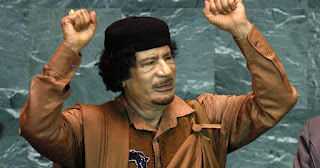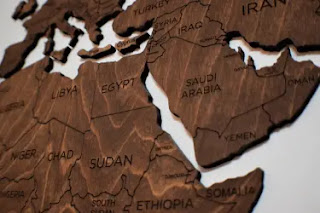The question of “good or bad” in leadership is a topic study that would warrant large volumes of publications. Muammar Gaddafi’s leadership in Libya lasted four decades and its effect on Libya’s revolution was significant and worthy of study, especially for Pan-African enthusiasts.
 |
| Col. Muammar Gadaffi |
Today Libya is a war-torn country. Its political stability since the 2011 Arab Spring protest and the fall of Muammar Gaddafi remains fragile and unpredictable.
Libya is also experiencing
unprecedented security issues that hinder smooth cooperation and operations necessary
for the development of the country.
Even though Muammar
Gaddafi did go down on history as a dictator and human rights violator, his
rise and fall was a regime that was full of many good and bad in equal
measure.
In the beginning, I
thought of Muammar Gaddafi as a dictator only because he was always in military
uniform and he had ruled for a long time. I bet we are all victims of this!
Then, after studying the
Libyan Civil wars before and after the fall of Muammar Gaddafi, I now understand
better the saying: one man’s freedom
fighter is another man’s terrorist.
What Did Muammar Gaddafi Do for Libya?
Many people, when asked why Muammar Gaddafi’s rule is not among their best-preferred figures of good leadership. They will dwindle the leader to human rights violations, supporting terrorism, murdering his own citizens, and leave it at that.
Many will overlook his
contribution to building Libya as a country, his call for national unity among oppressed
countries, and his valiant fight against imperialism all over the world.
Muammar Gaddafi actively
took part in the overthrow of King Idris of Libya. He led the revolution
that fully cut ties with colonial powers. He upheld Libya's independence and
declared it a free state that was eager to move from the bottom to the top.
He promoted domestic
projects that uplifted Libyan people to better living standards. He advocated
for farming, infrastructure, and the preservation of water sources. He also called for patriotism and national unity
among Libyans.
Unlike many African
leaders who waste valuable resources through rampant corruption, Gaddafi used
Libya’s own wealth from oil resources to uplift Libya from a lower third-world country to one with the highest living standard countries in Africa.
Using Libya’s proceeds
from Oil resources, Gaddafi managed to run a Green Revolution; spread farming
into the Libyan desert, a move that significantly reduced Libya’s overreliance
on foreign imports of food.
Muammar Gaddafi’s
33-million-dollar Man-Made River project ensured that fresh water was spread to
every corner of the desert country. Gaddafi solved Libya’s most dreadful
problems without relying on foreign financial aid.
No one states this fact
better than the leader of the American-based Nation of Islam, Minister Louis Farrakhan; the black
supremacist had also called for African leaders to rally behind Gaddafi
during his troubles with the West.
Was Muammar Gaddafi a Dictator?
After studying the rise
and fall of Muammar Gaddafi, it surely became difficult to differentiate a
dictator from a democrat.
Muammar Gaddafi believed that
every human need is and should be a human right. He expounded deeply on this thought in his 'Green Book,' where he outlined that denial of human needs is the root cause of
oppression.
In his Green Book,
Gaddafi concludes that every foundation of oppression lies in the exploitation
of the needs of the oppressed.
During his reign, Muammar
Gaddafi walked his talks when he implemented better housing for Libyans,
nationalized oil companies, and provided fresh water in the heart of a desert, for the benefit of the Libyan people.
Muammar Gaddafi’s views
on democracy were quite astonishing. He always thought of monarch governments
and republic systems to be just the other “face of the coin” of dictatorship.
According to Muammar
Gaddafi, the monarch owns the land and everything on it. The republics, on the
other hand, are allowed to elect their monarchs in the form of a president.
To counter such
ideologies, Gaddafi birthed the idea of the “state of the masses.” He led the Libyan
revolution to take the form of the rule of the people by the people.
In what is known as
Jamahiriya democracy, Gaddafi envisioned a rule of people by the people and not
governments. According to Gaddafi, the masses were to actively take part in
government matters and equally make contributions.
Muammar Gaddafi founded the
Great Socialist People’s Libyan Arab Jamahiriya and only declared himself a
member and a symbolic figurehead, not a president. He kept the title - leader of the revolution.
I never read a book or
any editorial that ever referred to Gaddafi as president, prime minister, or
governor. All along he had just been Col. Muammar Gaddafi. He was known as the leader of the Libyan people.
Comparing Libya’s
situation after the fall of Muammar Gaddafi to when he reigned, I would
conclude that it was way better under Gaddafi’s dictatorship.
Today, Libya seems to be
in "lack" of a government in the primary. The country is infested with civil
unrest and geopolitical connivance.
The Fall of Muammar Gaddafi
Like many other leaders,
Muammar Gaddafi’s reign was not flawless, he had his fine share of consequences
of his political decisions as a leader of a free country.
Perhaps the fall of
Muammar Gaddafi should be blamed on disunity among regional neighbors and not on his dictatorship rule, for he had enjoyed a great following that lasted for four decades.

Muammar Gaddafi did all
that was to be done to get Libya back into the international table and to détente
with several countries that did not lock horns with his leadership policies: the USA, France, and the UK in particular.
Additionally, Muammar
Gaddafi advocated for open and pragmatic democracy at the world level. In 2009 on
his maiden address to the UN in New York, he defied the standard UN protocol of 15
minutes at the podium and delivered a 100 minutes lecture to the UN general
assembly.
He pointed out to the UN
security council, which he thought of as 'the greatest den of terrorists' known on
earth. He questioned the council membership rights and its influence on the
general assembly of over 190 countries that he remarked as 'uncalled for'.
His remarks against the
West were very bold as he pointed very many fingers at them for causing
oppression in many developing states by their coercive foreign policies and
unremitting urge for interfering in other countries' internal affairs.
Muammar Gaddafi’s
struggle to liberate many oppressed states took a stall in Libya only due to the lack of unity among his people and from his regional neighbors.
The very sad accusation
that he sorted allegiance with African leaders only after receiving a rebuff
from Arab leadership points to the disunity aspect among developing countries.
An aspect that has held back Africa and the Middle East when critical steps
forward are needed.
Consequences of such disunity have been witnessed not only through the fall of Muammar Gaddafi but also in the ousting of several leaders like Patrice Lumumba in Africa and Saddam Hussein in Asia.
It’s rather surprising
that the fall of Muammar Gaddafi has been referred to as “a REVOLUTION” by some who can be referred to as colonial sympathizers for the lack of a better word. But the state of Libya after the
fall of Muammar Gaddafi only points to a “BACKWARD REVOLUTION.”
A Lesson to the Entire African Continent
Africa must embrace
national unity to increase cohesion among its people. Colonial borders and
other aspects of balkanization are time-worn and unpleasant in this age of
civilization.
Col. Muammar Gaddafi’s
Libya, just like Thomas Sankara’s Burkina Faso, proved that Africa must not
heavily depend on foreign aid to develop itself. And, Africa under top-notch leadership can rise up above mediocrity of any kind to occupy its rightful position in world affairs.
If there is but something
that can make Africa fully work to its desired potential, then it is the revision
of its Leadership. Till then, the “sleeping giant” will continue snoring.




Very good content..am enlightened
ReplyDelete